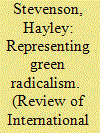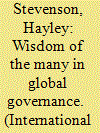| Srl | Item |
| 1 |
ID:
088727


|
|
|
|
|
| Publication |
2009.
|
| Summary/Abstract |
The international governance of climate change was initially informed by two norms concerning who should take responsibility for mitigating climate change and how such mitigation should be pursued.1 Since the early 1990s, these norms have been contested by several states. In this article the author argues that such contestation is a product of the perceived incongruence between these norms and the domestic conditions of those states they seek to govern. Following an overview of the emergence and contestation of climate governance norms, the author elaborates on this relationship between international norms and domestic conditions. These theoretical assumptions are then explored in the context of Australia's response to international climate governance norms from the late 1980s to 2007. As the author demonstrates, the perceived incongruence of these norms with domestic conditions led Australia's foreign policy makers to contest the norms and focus on the construction of alternative governance processes by reframing the issue of climate change. Through a diversion of attention away from historical emissions to future emissions and possible technological mitigation options, climate governance was temporarily reconciled with Australia's domestic conditions. However, the author suggests that this came at the expense of international equity and long-term national sustainability.
|
|
|
|
|
|
|
|
|
|
|
|
|
|
|
|
| 2 |
ID:
105637


|
|
|
|
|
| Publication |
2011.
|
| Summary/Abstract |
This article explores the process by which norms of international climate governance have diffused and evolved over time. The author develops a constructivist explanation for observed normative shifts in international climate governance. This explanation highlights the importance of building and maintaining congruence between domestic conditions and international norms. Due to the inherently fluid nature of both domestic conditions and international norms, it is argued that normative congruence building should be understood as an integral and iterative aspect of the norm diffusion process. This argument is substantiated through an analysis of the norm diffusion process in the context of India: a state commonly identified as an important player in international climate change politics, but one that has received surprisingly little scholarly attention in this area.
|
|
|
|
|
|
|
|
|
|
|
|
|
|
|
|
| 3 |
ID:
131702


|
|
|
|
|
| Publication |
2014.
|
| Summary/Abstract |
In recent years, the post-neoliberal bloc of Latin America countries, ALBA, has fashioned a role for itself in international climate change negotiations as representing the voice of 'the people'. In this article I draw on innovative theorising of representation to critically examine this claim. I argue that although ALBA has sought to construct a constituency based on the malleable notion of 'the people', its function is better understood as 'discursive representation', and specifically as representation of Green Radical discourses. Such forms of representation are potentially important in global governance given the challenges of capturing the interests of all affected parties. I critically evaluate this case of discursive representation in terms of its rhetorical efficacy; accountability; consistency; and legitimacy. Although certain favourable elements emerge from this evaluation, this case also points to the hazards of transmitting a public discourse through a state-based representative in multilateral settings
|
|
|
|
|
|
|
|
|
|
|
|
|
|
|
|
| 4 |
ID:
148029


|
|
|
|
|
| Summary/Abstract |
A growing body of literature highlights moral reasons for embracing global democracy. This literature justifies democracy on the grounds of its intrinsic value. But democracy also has instrumental value: the rule of the many is epistemically superior to the rule of one or the rule of the few. I draw on the tradition of epistemic democracy to develop an instrumentalist justification for democratizing global governance. I develop an epistemic-democratic framework for evaluating political institutions—one composed of three principles. The likelihood of making correct decisions within institutions of global governance increases when those institutions maximize (1) human development and capacity for participation; (2) their internal cognitive diversity; and (3) public opportunities for sharing objective and subjective knowledge. Applying this framework to global governance produces a better understanding of the nature and extent of its “democratic deficit,” as well as the actions required to address this deficit.
|
|
|
|
|
|
|
|
|
|
|
|
|
|
|
|